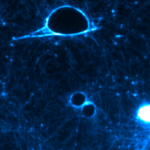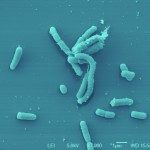About
CNF1 is a toxin that catalyzes the permanent activation of host RhoA, Rac1 and Cdc42 small GTPases by selective deamidation of a glutamine residue into a glutamic acid. This 1 dalton post-translational modification can be viewed as a “somatic missense-mutation” that promotes a permanent activation of Rho GTPases. Deamidation reaction is shared by a large number of bacterial effectors targeting different cellular proteins. Moreover, the spontaneous deamidation reaction of glutamine and asparagine residues of proteins is considered an intrinsic molecular clock of protein aging. Interestingly, we showed that eukaryotes have evolved a selective system that protects cells from the over-activation of Rho GTPases and notably in response to CNF1 action. This involves the targeting of activated Rho proteins to the ubiquitin-mediated proteasomal degradative system, as a function of their strength of activation. Study of CNF1 has been instrumental in deciphering the E3 ligase responsible for the ubiquitination of Rac1, namely the HACE1 tumor suppressor. Our objective is to combine signaling approaches, cellular microbiology and animal models to study the impact of dysbiosis and Rho GTPases unbalance on host cell proliferation, migration and tissue integrity, processes that play instrumental roles in oncogenic transformation.
In this context we participate to the collaborative project ONCOMIX, involving University Hospital oncologists and teams at the Pasteur Institute, that offers a network of expertise to address at the molecular level possible links between digestive flora and colon cancer. This should offer new possibilities to develop personalized approaches to prevent, diagnose and predict therapeutic response of colorectal cancer.






